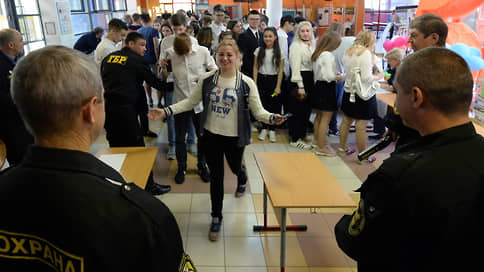Special security schools – Picture of the day – Kommersant
[ad_1]

On Friday, the State Duma Committee on Security and Anti-Corruption held a round table on the topic “Security of educational organizations in modern conditions.” During the discussion, the security forces invited to the event even slightly went beyond the scope of the stated topic, proposing to completely organize supervision of all mentally unhealthy citizens in order to “stop them at distant approaches.” And a representative of the Russian Orthodox Church proposed to ban Satanism. But so far, the main outcome of the round table has been a proposal to develop a unified standard for the anti-terrorist protection of schools and create a special working group that will deal with this issue.
The round table was attended by representatives of the Ministry of Internal Affairs, the Ministry of Emergency Situations, the Prosecutor General’s Office, the Investigative Committee (IC), the Russian Guard, as well as the Ministry of Education and the Ministry of Education and Science, parents’ communities, etc. Vasily Piskarev, Chairman of the State Duma Security Committee (United Russia), in his speech proposed to develop a unified a law regulating safety issues in schools (today these issues are regulated by dozens of regulations). To this end, he proposed to create a working group with the participation of relevant ministries and departments.
“In Russia, it is necessary to introduce a single standard for the anti-terrorist protection of schools. And it should be mandatory for execution in absolutely all educational institutions of the country,”— wrote Deputy Piskarev in his Telegram channel.
Deputy Chairman of the Security Committee Ernest Valeev (ER) noted that today society is faced with such an insufficiently studied phenomenon as an aggressive attack on educational organizations. He cited the data of the Ministry of Internal Affairs of Russia: in 2022, 19 incidents related to armed attacks on educational organizations were registered in 16 regions, of which 15 were stopped at the preparation stage.
“The other day we recently met with the Minister of Emergency Situations, he proposed a simple, low-cost way of protection: in each class, provide the opportunity to close, barricade themselves in order to wait for some time before the police arrive,” the deputy said. In his opinion, if “big money” is invested, then schools will be able to provide “serious security.” “But in no case should they turn an educational institution into a prison. But we must ensure the safety of children,” Mr. Valeev summed up somewhat paradoxically.
Senator Lilia Gumerova suggested developing a single code that would clearly define security measures agreed with all relevant and supervisory agencies.
Deputy Minister of Education Andrey Korneev shared his calculations: in order to fulfill the requirement of anti-terrorist protection of educational organizations, the regions need to allocate about 42 billion rubles.
“Unfortunately, we still do not find support from the government commission for budget projections,” the deputy minister lamented, but promised to continue seeking assistance to the regions. He also noted that the structural features of schools often do not allow the construction of a perimeter fence as “the first line of defense.” Andrei Korneev also noted the problem of the low level of training of the guards, who, according to him, often do not even know the basic rules of conduct during the evacuation.
Chairman of the State Duma Committee on Education Olga Kazakova (ER) complained that in schools the function of deputy directors for security is often performed by head teachers. “It is impossible to produce a separate structure for each task, no budget is enough,” retorted Lilia Gumerova.
The representative of the Prosecutor General’s Office, Irina Rebrina, suggested considering the issue of stimulating private security companies when they conclude an agreement on the protection of social facilities.
All educational institutions, regardless of category, should be provided with protection, she believes. Ms. Rebrina recalled tragedy in a kindergarten in the Ulyanovsk region, where a mentally ill local resident shot an employee and two children: “A month before the tragedy, the category of the educational institution was changed, as a result, ordinary nannies were on guard.” Also, according to her, the Prosecutor General’s Office advocates that the Ministry of Internal Affairs be informed about mentally unhealthy citizens.
“We are not talking about interfering in the treatment of these people, we are only talking about looking after them by specially authorized bodies, about getting information from neighbors, relatives about what is going on in their heads so as not to harm our children” , the policeman explained.
The representative of the Investigative Committee, Viktor Svechinov, agreed with his colleague: “If a person has already started an attack, all the requirements that we are discussing will only minimize the number of victims. You need to stop him at the far approaches. Special attention is needed for people with mental disabilities. There are signs that show that a person is preparing an attack, he is broadcasting certain ideas.”
The representative of the Ministry of Internal Affairs, Maria Koltsova, noted that her department is well aware that the safety of children “cannot be ensured by creating a zone with barbed wire from the school,” but safety rules must be observed. As one of these measures, she proposed the installation of bulletproof glass at the guard post.
Priest Fyodor Lukyanov, chairman of the Patriarchal Commission on Family Affairs, Protection of Motherhood and Childhood, looked at the problem from a different angle and proposed to ban Satanism, since “it provides for the sacrifice of people for the sake of its great goals.”
[ad_2]
Source link








